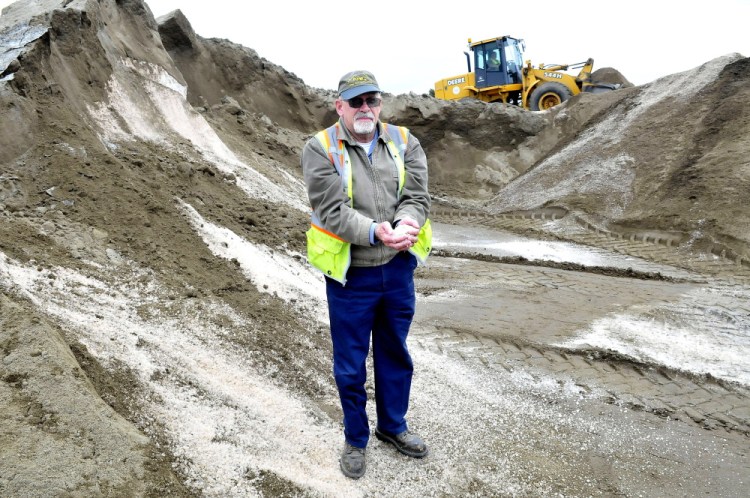While several other states, chiefly in the Midwest, are reporting a dramatic increase in the price of road salt, public works departments in Maine are expected to pay about the same per ton as they stock up on salt for the coming winter.
Most Maine municipalities, including Waterville and Augusta, buy salt through the Maine Department of Transportation. Maine DOT contracted for its salt requirements for the upcoming winter at last year’s prices for the department’s four regions in the southern portion of the state. To the north, Aroostook County’s contract price was increased 2 percent, said Brian Burne, a Maine Department of Transportation highway maintenance engineer.
Elsewhere in the country, highway departments are facing huge increases in prices for road salt. Across the Midwest, salt prices have increased 43 percent to 128 percent for communities in Ohio, 57 percent in Indiana and 46 percent in Michigan.
As they replenish their salt sheds and piles after last year’s challenging winter, reports from states such as Ohio, Michigan, New York and Massachusetts suggest that the cold, snowy weather increased demand and reduced supply, resulting in sharp increases in price per ton, with prices in some Ohio counties tripling over previous years.
Increases also have hit some Northeastern states, including a 36 percent hike for communities in Massachusetts and 27 percent in New York.
Comparatively stable prices in Maine are the product of several causes.
“Some of it is we just have a real good working relationship with our suppliers,” Burne said.
A number of states experiencing price hikes were not able to negotiate a contract extension with suppliers, Burne said. He said the Maine DOT benefits from having salt delivered by cargo ships that land in the state’s deepwater ports from the salt mines of South America.
“We have better access than a lot of the Midwest states have,” he said.
Augusta Street Superintendent Jerry Dostie said after he read an article Tuesday about Midwestern states dealing with a steep price hike, he called the city’s supplier but was told that the city would be able to get its contracted 3,000 tons of salt at last year’s prices.
Many communities either buy road salt through a cooperative program with the state or band together regionally.
Some central Maine towns solicit bids through the Kennebec Valley Council of Governments.
“It’s pretty good, because you’re talking about a lot of buying power,” said Herb Whittier, Monmouth’s public works director. He said the winning bidder for the 2014-2015 season was Harcross Chemicals, which has offices in Westbrook and will be supplying salt for $57.98 per ton.
Monmouth paid $55.08 per ton last year for its salt and generally uses 500 to 600 tons a season, Whittier said.
Waterville’s public works director, Mark Turner, said he was not surprised when he read news about salt prices climbing in other states.
“I’m not surprised, because there are shortages periodically where supplies become scarce,” he said. “But supplies in Maine are still fairly good, and the prices are stable.”
He said the city buys 2,700 tons of salt annually, and this year, as in the past three years, the city can buy the salt at $58.60 per ton.
What will affect the Public Works Department spending for the 2014-15 winter will be the number of storms that hit Waterville. The agency budgets for 15 to 20 storms per year, but last year there were 38 storms that quickly ate into the department’s resources and its salt supply, Turner said.
Farmington Public Works Director Denis Castonguay said the town normally orders around 1,200 tons of salt, and this year, he said, he’s increased the estimate of the salt needed to 1,500 tons. He expects the town will budget next year for $110,000 to $120,000 for salt compared with $100,000 for this year.
He said that the town is hoping it does not have a harsh winter like last year’s, when the public works crews ran down their salt reserve and struggled to chisel ice off pavement in temperatures too cold for salt to work.
“We still have a hangover from last winter,” Castonguay said.
The Associated Press contributed to this report.
Kaitlin Schroeder — 861-9252
Copy the Story LinkSend questions/comments to the editors.



Success. Please wait for the page to reload. If the page does not reload within 5 seconds, please refresh the page.
Enter your email and password to access comments.
Hi, to comment on stories you must . This profile is in addition to your subscription and website login.
Already have a commenting profile? .
Invalid username/password.
Please check your email to confirm and complete your registration.
Only subscribers are eligible to post comments. Please subscribe or login first for digital access. Here’s why.
Use the form below to reset your password. When you've submitted your account email, we will send an email with a reset code.